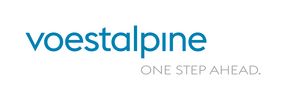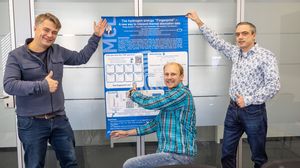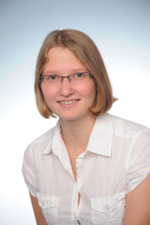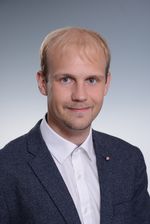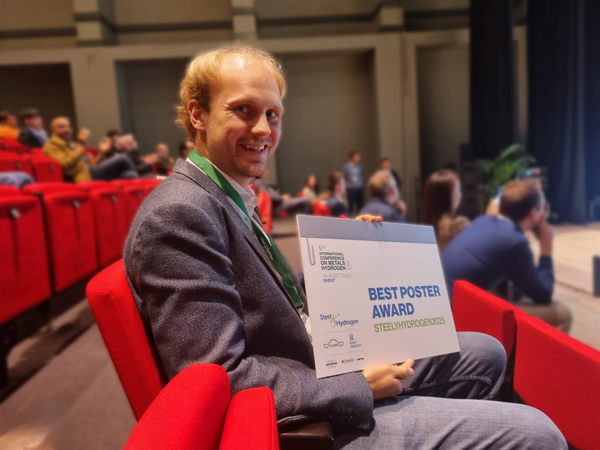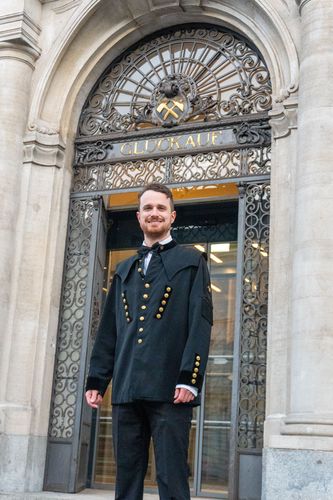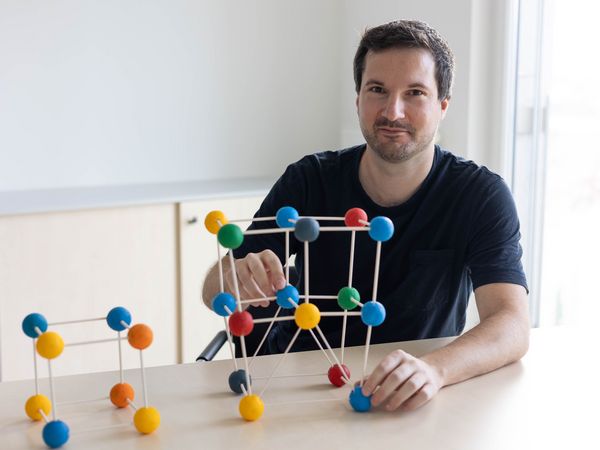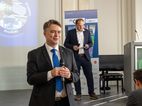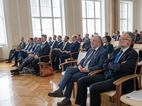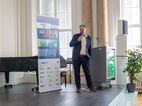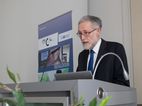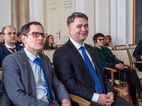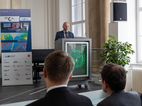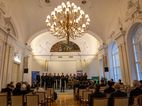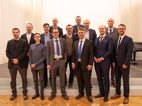CD Laboratory for Digital Material Design Guidelines for Mitigation of Alloy Embrittlement
Duration: 01.01.2025 - 31.12.2031
Thematic Cluster: Materials
This CD Laboratory focuses on the embrittlement of engineering and functional materials, as well as methods for predicting and avoiding it.
The higher the toughness of a material, the better it resists fracture and crack propagation. Similarly, higher ductility enhances its resistance to failure by means of plastic deformation. Both of these properties are crucial in controlling the risk of material failure during both production and operation of structural and functional materials, making them essential in a wide range of applications.
The challenge here is that many known embrittlement phenomena that reduce the ductility and toughness of metallic alloys like steels or Ni-base alloys (and can make them unusable in the worst case), act on different length and time scales. This often results in a mostly qualitative understanding, rather than a comprehensive and universal multiscale approach that includes all these phenomena and ex-plains how they are related to one another.
This again makes it difficult to predict the properties of materials – especially when it comes to developing new materials, where assessments of their ductility and toughness can only be made to-wards the end of the development cycle. However, rapid and reliable predictions of the toughness and ductility of new materials are essential for enabling technologies for the energy transition: They play a central role, particularly in the context of the climate crisis and global economic challenges, which demand rapid improvements to existing and the development of new, ‘green’ materials.
This new CD Laboratory has therefore set itself the goal of developing a comprehensive understanding of the fundamental principles of these embrittlement phenomena using a computer-aided approach, validated and supplemented by high-resolution experimental methods. This approach should enable the targeted application of strategies to enhance desired properties, thereby creating more reliable materials.
On the one hand, these research results will enable the enhancement of existing materials and their adaptation to new requirements with regard to damage tolerance. On the other hand, this fundamental knowledge, in combination with the developed computational tools, will significantly accelerate the development cycle of new materials via digitalization. Particularly in the context of a sustainable circular economy, this accelerated development of ‘green’ construction and functional materials will make an important contribution to the energy transition.
Partner
Publications
New paper: The Fingerprint method for analysis of thermal desorption spectra
Since 1982, hydrogen detrapping in steels has been analyzed using Gaussian peak fitting and Choo-Lee plots. But these methods rely on strong assumptions about TDS peak shapes and numbers.
Our new fingerprint method changes that!
By applying it to 8 TDS spectra from 3 Fe–C alloys, Philipp Hammer1, Oleg Peil2, Ahmad Azizpour2, Liese Vandewalle3, Kim Verbeken3, Tom Depover3, and Vsevolod Razumovskiy1 show it:
• Identifies activation energy distributions with high sensitivity
• Reveals each alloy’s unique “material fingerprint”
• Works even with a single heating rate — boosting experimental efficiency
Read more about how the fingerprint method simplifies TDS analysis and unlocks deeper insight into hydrogen trapping behavior.
Link to paper: https://doi.org/10.1038/s41529-025-00718-z
1Christian Doppler Laboratory for digital material design guidelines for mitigation of alloy embrittlement, Materials Center Leoben Forschung GmbH
2Materials Center Leoben Forschung GmbH
3Department of Materials, Textiles and Chemical Engineering, Ghent University
Team
Dr. Vsevolod Razumovskiy
Key Scientist Computational Materials Design
Head of the Christian Doppler Laboratory
+43 676 848883 532
Hamidreza Bakhshandeh
PhD Student
Sebastian Brötz
DI Nina Damm
DI Philipp Hammer
Dr. Max Ludwig Hodapp
Daniil Khodachenko MSc
DI Franco Moitzi
Stefan Netzer
DI Christian Posch-Peperkorn
Dipl.-Ing. Dr.mont. Oliver Renk
Group Leader - Department Materials Science
Chair of Physical Metallurgy
CDL Module Leader
Department of Materials Science
Montanuniversität Leoben
Roseggerstr. 12, 8700 Leoben, Austria
Tel:+43(0) 3842 402 4210
Mag. Katrin Salhenegger-Niamir
Marketing & Public Relations
Business Administration
Tel: +43 3842 45922 - 331
Mobil: +43 676 848883 331
Kathrin Seidl
Dr.-Ing Kiranbabu Srikakulapu
Senior Researcher
Chair of Physical Metallurgy
Department of Materials Science
Montanuniversität Leoben
Roseggerstr. 12, 8700 Leoben, Austria
Tel:+43(0) 3842 402 4208
Christian Stecher
Technician IT Services
Department Services
Tel: +43 3842 45922 - 493
Mobil: +43 676 848883 493
Email: christian.stecher(at)mcl.at
Dr. Lukas Walch
Events
Vsevolod Razumovskiy and Philipp Hammer at SteelyHydrogen 2025
In mid-October 2025, Vsevolod Razumovskiy and Philipp Hammer had the pleasure to visit the SteelyHydrogen conference, where every few years leading experts in the field of hydrogen-materials interactions convene in the beautiful city of Ghent. Joining forces, OCAS and Ghent University once again brought together internationally renowned experts and created an interesting program together with an atmosphere that sparked intense discussions, allowed for the meeting of old friends and making contact to new ones.
Vsevolod Razumovskiy presented his talk on ‘Computational design of hydrogen embrittlement-resistant alloys’, with co-authors Christian Posch-Peperkorn, Philipp Hammer, Oleg Peil, and Werner Ecker.
Philipp Hammer had the pleasure of presenting his poster ‘The hydrogen energy “Fingerprint” – A new way to interpret thermal desorption data’, a joint work of the Christian Doppler Laboratory for digital material design guidelines for mitigation of alloy embrittlement hosted at the Materials Center Leoben Forschung GmbH and Ghent University. He was very happy to receive the Best Poster Award of SteelyHydrogen 2025. In that regard, Philipp Hammer would like to express his special thanks to his co-authors Oleg Peil (MCL), Liese Vandewalle, Kim Verbeken, Tom Depover (all Ghent University), and Vsevolod Razumovskiy (MCL), as well as the funding organizations.
The financial support by the Austrian Federal Ministry of Economy, Energy and Tourism, the National Foundation for Research, Technology and Development and the Christian Doppler Research Association is gratefully acknowledged.
The authors gratefully acknowledge the financial support under the scope of the COMET program within the K2 Center “Integrated Computational Material, Process and Product Engineering (IC-MPPE)” (Project No 886385). This program is supported by the Austrian Federal Ministries for Climate Action, Environment, Energy, Mobility, Innovation and Technology (BMK) and for Labour and Economy (BMAW), represented by the Austrian Research Promotion Agency (FFG), and the federal states of Styria, Upper Austria and Tyrol.
This research was funded in whole or in part by the Austrian Science Fund (FWF) [10.55776/I6756].
This work was supported by the Special Research Fund (BOF, UGent) via grant BOF/STA/202309/025 and the FWF/FWO Weave program via grant G0A7J24N.
“Mitigation of Alloy Embrittlement” Workshop
The Mitigation of Alloy Embrittlement workshop is going to be held on May 20 to 21, 2026 in Schloss Retzhof. Please, save the date. Further details about the workshop and the detailed program will follow.
Congratulations to Dr. Franco Moitzi!
Franco Moitzi has successfully defended his dissertation with the title “Ab Initio Design of Materials” with distinction.
His research bridges the gap between purely theoretical descriptions of matter and the practical design of materials. Ab initio methods are approaches grounded in fundamental physical laws to describe the state of matter. During his doctoral work, Franco developed advanced ab initio computational methodologies, software tools, and robust, reusable workflows, which he integrated with AI-based methods to predict the properties of industrially relevant engineering alloys.
Franco would like to express his sincere gratitude to Dr. Oleg Peil (MCL), Univ.-Prof. Lorenz Romaner (MUL), and Prof. Andrei Ruban (KTH) for their guidance, support, and inspiring scientific discussions.
Franco will continue his work at the Christian Doppler Laboratory for Digital Material Design Guidelines for Mitigation of Alloy Embrittlement, led by Dr. Vsevolod Razumovskiy.
Please join us in congratulating Franco on this outstanding achievement!
MCL at CDG-Science Slam 2025: Short-Range Ordering – From Modeling to Measurement
How are atoms locally arranged? This is a central question in materials research – and the focus of our contribution to this year’s CDG-Science Slam!
Daniil Khodachenko and Franco Moitzi demonstrate how simulation and state-of-the-art measurement techniques work hand in hand to provide new insights into material behavior.
A big thank you to Daniil Khodachenko, Franco Moitzi, and Vsevolod Razumovskiy from the CD Laboratory for Digital Material Design Guidelines for Mitigation of Alloy Embrittlement at MCL!
ERC Grant for Materials Center Leoben: Dr. Max Hodapp Receives Prestigious Funding for AI-Based Materials Research
Materials Center Leoben (MCL) is celebrating a major milestone: For the second time, the center has been awarded a prestigious ERC Starting Grant by the European Research Council, one of the highest recognitions in European research funding.
With his project MAD-TENSOR, Dr. Max Hodapp, Senior Scientist at MCL and a member of the CD Lab team, is developing novel AI methods to accelerate the discovery of next-generation high-performance alloys. The goal is to design materials that combine multiple advanced properties, such as high strength and ductility which is a breakthrough for the materials of the future.
MCL at the Forefront of European Research
In 2025, MCL is the only applied research center in Austria, and one of just two non-university materials research institutions in all of Europe, to receive an ERC Grant in the field of materials science.
This recognition highlights not only the international impact of MCL, but also the importance of Leoben as a leading European hub for materials research.
Congratulations to Dr. Max Hodapp on this outstanding achievement!
New Christian Doppler Laboratory at MCL
On January 16, 2025, the new Christian Doppler Laboratory for Digital Material Design Guidelines for Mitigation of Alloy Embrittlement was officially opened in the AULA of the Montanuniversität Leoben. The laboratory is funded by the Federal Ministry of Labor and Economy.
Led by Dr. Vsevolod Razumovskiy, the laboratory combines state-of-the-art computer simulations with high-resolution experimental techniques to understand fundamental mechanisms of embrittlement phenomena and develop multi-scale computational tools for their prediction and prevention. The aim is to improve existing materials, develop new materials, and thus make an important contribution to the energy transition.
Company partners: voestalpine Wire Rod Austria GmbH, voestalpine Stahl GmbH, voestalpine BÖHLER Edelstahl GmbH & Co KG, EQUINOR ENERGY AS
For further details, please visit: www.mcl.at/index.php



















